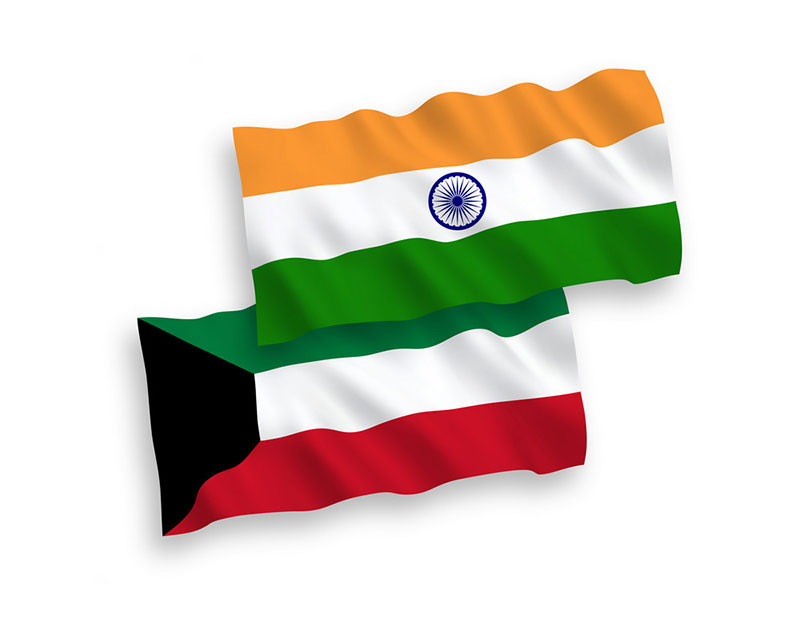


Indian Prime Minister Narendra Modi's two-day visit to Kuwait marked the first time an Indian PM has visited the country in 43 years. Modi was bestowed with the highest honour from Kuwait for his efforts in strengthening the relationship between the two countries. The two nations signed agreements in trade, defense, sports, culture, and solar energy, with promises of further collaboration in various sectors. The elevation of their partnership to "strategic" reflects the strong ties between the countries, with Kuwait being one of India's top trading partners and home to the largest Indian expatriate community.
Kuwait-India Relations: A Landmark Visit and Strategic Partnership
Background
Kuwait and India have enjoyed a long and cordial relationship dating back to the early 20th century. The two countries initially established diplomatic relations in 1961, and since then, their ties have steadily grown stronger.
Kuwait is among India's top trading partners, and it hosts the largest Indian expatriate community globally. The Indian community in Kuwait plays a significant role in the country's economy and contributes to the strengthening of bilateral relations.
Modi's Historic Visit
Indian Prime Minister Narendra Modi's two-day visit to Kuwait in 2018 was a historic milestone in bilateral relations. It marked the first visit by an Indian PM to the country in 43 years.
During the visit, Modi was bestowed with the Kuwait Order of Mubarak Al-Kabeer, the highest honor awarded by the country. The two nations also signed agreements in various sectors, including trade, defense, sports, culture, and solar energy.
Strategic Partnership
The agreements signed during Modi's visit elevated the bilateral relationship to a "strategic partnership." This reflects the growing importance and depth of ties between Kuwait and India.
Kuwait is a significant source of crude oil for India, and India is Kuwait's main export market for non-oil products. The two countries have also collaborated on infrastructure projects, cultural exchanges, and defense cooperation.
FAQs
1. What motivated Prime Minister Modi's visit to Kuwait?
Modi's visit aimed to strengthen the existing relationship between the two countries and explore new avenues of cooperation in various sectors.
2. What specific agreements were signed during the visit?
Agreements were signed in trade, defense, sports, culture, and solar energy. These agreements covered areas such as investments, energy cooperation, and defense procurement.
3. What is the significance of the "strategic partnership" between Kuwait and India?
The strategic partnership reflects the close ties and shared interests between the two countries. It provides a framework for enhanced cooperation in key areas of mutual interest.
4. What is the economic impact of Indian expatriates in Kuwait?
The Indian expatriate community in Kuwait plays a significant role in the country's economy. They contribute to sectors such as healthcare, education, and finance.
5. What are the future prospects for Kuwait-India relations?
With a strong foundation built on mutual respect and cooperation, Kuwait and India are expected to continue to enhance their strategic partnership in the coming years. Joint projects in areas such as infrastructure, energy, and technology are expected to further deepen their bilateral ties.

A terror attack at Bondi beach in Sydney, Australia has left at least 15 people dead, with 25 others still hospitalized. One of the alleged gunmen was previously investigated by Australia's national security agency, but was not deemed a threat. Vigils were held across the country to honor the victims, while the investigation now focuses on how the attackers were radicalized and the potential role of extremist ideology. The Five Eyes intelligence network will assist in the investigation as the nation's leaders vow to tighten gun laws.

A targeted terror attack on Sydney's Jewish community during Hanukkah celebrations has left at least 15 people dead, including a 10-year-old girl. The shooters have been identified as father and son Sajid and Naveed Akram, with the father being a legally licensed gun owner. His son, who was apprehended at the scene, was reportedly unemployed and a student at a religious institute, but had not been in contact with the owners for years. Police have not confirmed the suspects' nationality or origins.

Naveed and Sajid Akram are the alleged shooters behind the anti-Semitic terror attack at Bondi Beach in Sydney, Australia, which left 16 people dead and dozens injured. Naveed, a bricklayer, had previously been investigated for his support for Islamic State and had a history of boxing. His father, Sajid, was fatally shot during the attack and was known to have legal firearms registered to him. The suspects' Islamic teacher has publicly condemned the attack, revealing that Naveed had been awarded a certificate for mastering the Quran.

In a shocking and distressing turn of events, it has been confirmed that the deadly terror attack at Sydney's Bondi Beach was carried out by a father-son duo. Authorities have stated that they are not looking for any additional suspects and that the death toll has risen to 16 people, with at least 40 others injured. The incident, which occurred during a Jewish community event, has been classified as a terrorist attack and has garnered support for the country's Jewish community from top government officials.

In his departure statement, Indian Prime Minister Narendra Modi announced his visit to three countries, Jordan, Ethiopia, and Oman, which share both cultural and contemporary relations with India. The tour, which marks 75 years of diplomatic relations between India and Jordan, will see PM Modi engaging in discussions with top leaders of these nations, including King Abdullah II and Prime Minister Jafar Hassan. The tour presents an opportunity for India to strengthen its ties with these countries.

In an attack at a public Hanukkah celebration at Bondi Beach, Sydney, a father-son duo opened fire, killing 16 people and injuring 40. While one gunman has been identified as Naveed Akram, the other has been identified as Sajid Akram, both Pakistani nationals. It was revealed that Sajid Akram had held a gun license for 10 years, and his son was previously investigated by Australia's domestic intelligence agency for his ties to an IS terrorism cell. The shooting has been condemned as a deliberate targeting of the Jewish community on the first day of Hanukkah.

The two men responsible for the Bondi Beach mass shooting have been revealed as a father and son duo. New South Wales police have identified the shooters as 24-year-old Naveed Akram and his father, Sajid Akram, aged 50. Naveed was apprehended at the scene and is currently in a critical but stable condition under police guard. Meanwhile, Sajid, who owned a fruit shop, was killed at the scene of the attack.

The city of Los Angeles is on high alert after a horrific mass shooting at a Hanukkah celebration in Sydney, Australia, which claimed the lives of 16 people. In response, the LAPD has announced additional patrols at Jewish facilities and events throughout the county, while also expressing solidarity with the Jewish community. The public is advised to remain vigilant and report any suspicious activity, and local religious institutions are urged to review their security protocols. The tragic incident serves as a reminder of the need for global unity in standing against hate and violence.

In a statement released on Sunday, Hamas confirmed the death of one of its top commanders, Raed Saad, who was killed in an Israeli strike outside of Gaza City. Israel had identified him as a key figure responsible for a 2023 attack that led to the recent conflict in Gaza. Amidst ongoing tensions, Hamas has also announced the appointment of a new commander, vowing to respond to Israel's "aggression".

Leaders from around the world expressed shock and solidarity after a terrorist attack at Bondi Beach in Sydney, Australia killed at least 11 people during a Hanukkah event. Australian police have declared the incident a terrorist attack and are working to identify those responsible. Indian Prime Minister Narendra Modi strongly condemned the attack, stating that India has zero tolerance towards terrorism. Leaders from Europe, the Middle East, and the Pacific also sent messages of condolence and denounced the violence.